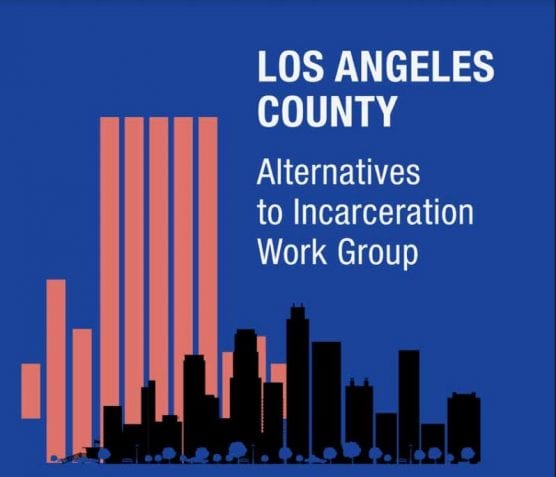A report presented to the Los Angeles County Board of Supervisors by the Alternatives to Incarceration Work Group Tuesday included a first look at more than 100 strategies that could potentially reshape the criminal justice system in Los Angeles.
The strategies are designed to allow people affected by the justice system who would benefit from mental health care and other services to receive them in their communities, and explicitly address the disparate racial impacts of the justice system.
View the complete report here.
The work group, established by a Board motion on February 12, was charged with helping the County develop and scale up alternatives to incarceration through a “care first and jail last approach.”
It includes community stakeholders appointed from each of the five supervisorial districts as well as representatives from 16 individual county departments overseeing matters of health, criminal justice, and social services.
“The recommendations shared today reflect our work to date, but we hope they will lay the groundwork for a transformational shift to a system of alternatives to incarceration,” said Dr. Robert Ross, President of The California Endowment and chair of the Work Group.
“This future places care first and it centers human beings; it is a community-based integrated network,” Ross said. “It sees people with needs rather than as risks or threats, it looks through a lens of public health rather than punishment, and it is decentralized throughout Los Angeles County, keeping our brothers and sisters from falling out of the community at sites located in our neighborhoods.”
“The people locked up in Los Angeles County, as everywhere in America, are disproportionately black and brown,” said workgroup member Dr. Kelly Lytle Hernandez, director of the Ralph Bunche Center for African American Studies at UCLA and co-chair of the work group’s ad hoc committee on Data & Research.
“At every step, this workgroup has engaged how deep histories of race remain at the root of contemporary inequities at the county jail, and at every step forward, we are committed to acknowledging, studying, and dismantling those legacies of systemic racism,” Lytle Hernandez said.
The motion establishing the Work Group is part of a wide-ranging County effort directing development of a decentralized approach to mental health and public safety that would divert people from jail to community-based mental health treatment wherever possible.
Tuesday’s report is the first part in a process leading towards the expected submission of a final report in December 2019, when action items will be taken. Its vision indicates to the Board the direction in which it intends to take the next phase of this work.
The report presents goals divided into five categories: Community-Based Systems of Care, Justice System Reform, Community Engagement, Funding, and Data and Research.
Community-Based Systems of Care
“Today, if you are someone in Los Angeles County struggling with mental health, substance use, or housing needs you are met with systems that do not have the capacity to adequately support you, and you then end up in our hospitals, jails, or on our streets,” said Eunisses Hernandez, LA Campaign Coordinator for JustLeadershipUSA and co-chair of the Work Group’s ad hoc committee on Community-Based Systems of Care.
“The decentralized community-based systems of care envisioned and proposed by the ATI Work Group would create thousands of new opportunities for people in need of support and their loved ones to access services provided in their communities,” Hernandez said. “Investing in this decentralized system of care will reduce our heavy reliance on emergency rooms and jail cells to handle our most vulnerable community members.”
Strategies for Community-Based Systems of Care address the need to strengthen and expand a decentralized model of care to address issues of mental health and substance use disorder, instead of trapping people with clinical needs in a cycle from the streets to jail and back.
Instead, these strategies adopt principles of public health through preventative approaches. They propose matching individuals with mental health and substance use disorders to services near where they live, removing barriers to care, and helping community providers develop the capacity to offer that care across the County.
Justice System Reform
“Law enforcement are not trained mental health professionals,” said Cheryl Newman-Tarwater, Commander with the Los Angeles Sheriff’s Department Custody Services Division-Specialized Programs and co-chair of the Work Group’s ad hoc committee on Justice System Reform.
“However, with appropriate training, law enforcement officers can interact sensitively and professionally with people that have behavioral health needs,” Newman-Tarwater said. “Law enforcement has partnered with the Los Angeles County Department of Mental Health to create a dynamic duo. A specially trained law enforcement officer combined with a mental health clinician have helped thousands to connect with much needed mental health services, but more teams are needed to work with all communities throughout Los Angeles County. Additionally, teams need to be expanded to scale exclusively made up of mental health professionals to work with families and community members with mental health needs.”
Justice System Reform strategies will shift resources and tactics from a punitive criminal justice response to a public health, trauma-informed approach to crisis—making communities safer and using resources more effectively. They focus on diverting people away from the front door of the system—connecting people in crisis to mental health and substance use disorder services in their own neighborhoods, rather than relying on law enforcement, courts and the jail to provide desperately needed services.
For those who do end up arrested and in jail, these strategies can greatly increase the county’s ability to provide safe and effective alternatives to custody. They build on many strategies already under development in the county, such as the successful diversion of thousands of people with mental disorders from the Jail through the Office of Diversion and Reentry.
Community Engagement
“Let’s build our alternative system with the people who have the most at stake,” said Work Group member Dolores Canales, Community Outreach Director of The Bail Project and co-chair of the Work Group’s ad hoc committee on Community Engagement.
“Let’s have two-way conversations where people impacted by the justice system are at the core of the dialogue,” Canales said. “Let’s fund our outreach so people don’t have to sacrifice in order to be heard. Let’s take the conversation into the jails and talk to the people who know it from the inside.”
Community Engagement strategies ensure that voices and expertise from the communities most affected by incarceration be built into the development of alternatives. They include a series of ten workshops including three inside jails or juvenile halls, and the creation of an advisory collaborative comprising system-impacted people that can interface with the community and local law enforcement.
Funding
The report highlighted Funding strategies and principles that could help realize the report’s proposals, proposing to prioritize investment in community-based systems of care in order to leverage public funds and expand services that are critical to improving public health and reducing over-reliance on the justice system.
Data & Research
“We can’t solve one of the most important public health problems of our time without data,” said Dr. Kristen Ochoa, Medical Director of the Office of Diversion and Reentry and co-chair of the Work Group’s ad hoc committee on Data & Research. “Through research we will better understand the needs in the jail and in the community so we can address them honestly and systematically.”
The work group’s Data & Research strategies analyze racial disproportionality in the jail population, with special attention to the mental health population. Data employed by the Work Group in the development of recommendations includes race, gender, age, charges, repeat bookings, geography, homelessness, mental health status, length of stay, number of pre-trial individuals, substance use disorder and co-occurring disorders, and serious medical needs.
* * * * *
On Tuesday afternoon, Supervisor Mark Ridley-Thomas released a statement commenting on the report’s findings.
“I am thankful to the Alternatives to Incarceration Working Group and its leaders for accomplishing so much in a very short amount of time. What they have done is extraordinary.
“They are putting together a roadmap that centers care and treatment as the primary priority, and incarceration as a tool of last resort. For the system, it represents a shift in paradigm to a care first ethos that internalizes the challenges faced by our justice-involved.
“Additionally, while this interim report makes clear that the County must do much more to increase our alternatives to incarceration, the fact that the Working Group incorporated so much of the infrastructure that we’ve already built – such as the Office of Diversion and Reentry, psychiatric urgent care centers and sobering centers, as well as the state-of-the-art MLK Behavioral Health Center – signals we are heading in the right direction.
“I look forward to seeing, and acting on, the ‘Final Roadmap.’ I am confident it will help us to avoid unnecessary incarceration as well as support individuals and families to stay housed and employed, further disrupting the vicious cycle between jails and homelessness.”
Like this:
Like Loading...
Related





 Tweet This
Tweet This Facebook
Facebook Digg This
Digg This Bookmark
Bookmark Stumble
Stumble RSS
RSS

























REAL NAMES ONLY: All posters must use their real individual or business name. This applies equally to Twitter account holders who use a nickname.
No Comments